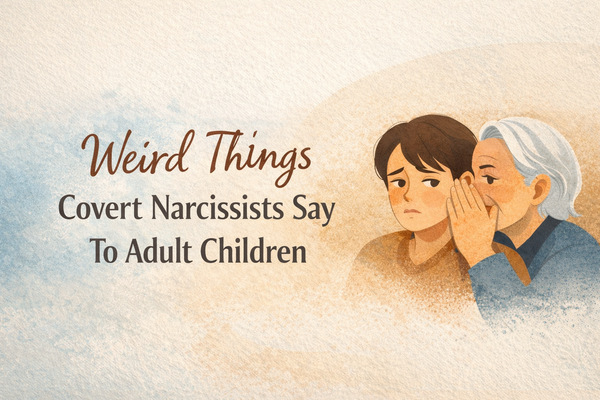Vulnerable narcissists like covert narcissists portray themselves as reserved, uncertain, and nervous. However, people suffering from vulnerable narcissism have same kind of insecurities as patients of narcissistic personality disorder (NPD).The vulnerable narcissists have a unique way of showing these qualities and that can make individuals fall prey to their weird manipulation and exploitation.
If you are also encountering a vulnerable narcissist, then keep reading as we will how to identify them and approaches to deal with them effectively.
Traits of Vulnerable Narcissists
Here are some of most common qualities possessed by vulnerable narcissists
1 Appear as a shy Person
Instead of using loud behaviours to attract attention, a vulnerable narcissist often prefers smaller, more intimate conversations where they intentionally control how the interaction plays out.
2.Sensitivity to criticism
The root of NPD is self-doubt, they are extremely sensitive to critique and will usually have an abrupt response to critique or apparent criticism.
3 Higher levels of anxiety
Vulnerable narcissists normally have low self-esteem as compared to the grandiose narcissists and will often centre on deliberately recompensing for their anxieties more.
4 Self-serving empathy
A vulnerable narcissist often portray themselves as an emphatic person. But, they might completely detach themselves after getting the required care or using shared information against a person.
5 Inflated sense of self-importance
A vulnerable narcissist might pass remarks on their dominance in personalised settings or just to themselves internally. They might also show their moods of importance with elusive actions like rolled eyes or yawning when another person communicates.
Therapeutic Methods for Managing Vulnerable Narcissism
1. Cognitive Behavioural Therapy
Cognitive behavioural therapy (CBT) is an organised, goal-oriented therapeutic method.
Mental health experts, such as psychologists, counsellors and therapists utilize it to treat or accomplish mental health conditions and emotional worries. It’s one of the most popular forms of analysis.
CBT is currently based on numerous central values, such as:
Psychological issues are mostly based on difficult or uncooperative forms of thinking.
Psychological issues are partially based on learned forms of awkward behavior.
Psychological issues are partly based on problematic core beliefs, including central ideas about yourself and the world.
People suffering from psychological issues can learn better effective methods of managing with them. This can help get rid of their symptoms and expand their psychological well-being.
2. Psychodynamic therapy
Psychodynamic therapy is a kind of psychotherapy that emphases on how automatic procedures affect a person’s present behaviour. It’s based on the fact that a person’s moods, feelings, and behaviors are affected by psychological forces, especially those from early in life. It is one of the most popular methods to treat vulnerable narcissism.
3. Mindful Self-Compassion Program
The Mindful Self-Compassion (MSC) program was created by Christopher K. Germer, PhD and and Kristin Neff, PhD . These two experts are actually the pioneer & researcher in the field of self-compassion. Actually this method was an amalgamation of psychotherapy and mindfulness. MSC integrates the skills of self-compassion and mindfulness, offering a strong tool for emotional stability. The program includes theoretical learning, thoughts, and informal self-compassion practices planned to be utilized in routine life.
Numerous randomized-organised trials have portrayed that the MSC program largely improves emotional, and physical wellbeing. It improvements pleasure, decreases anxiety and depression, decreases burnout, physical pain, and much more.
4. Emotional Regulation
Emotional regulation is a dynamic and multifaceted process by which we face and express our feelings .It can be conscious, like keenly choosing to calm yourself down after a tense meeting, or unconscious, like personally sensing relief after a deep breath . It is kind of process that helps to keep a balance, guaranteeing that feelings do not overpower or disturb our routine working.
Furthermore, effective emotional regulation also enable us to reply properly to challenging life situations without becoming overpowered or behaving unwarily. Mainly it is a process that encourages stability and mental health. Whereas challenges with regulations can cause various trials that can have a deep effect on our sense of health, our connections, and our capabilities to operate in the whole population.
5. Dialectical behaviour therapy (DBT)
Dialectical behaviour therapy (DBT) is a kind of talk therapy .It’s founded on cognitive behavioural therapy (CBT), however it’s normally modified for individuals that experience intense emotions.
It is a term that means mixing opposite ideas into one strategy to achieve some common objective. DBT emphases on aiding people accept the reality of their lives and their behaviours, as well as supporting them to learn various ways to transform their lives, as well as their uncooperative actions.
Dialectical behaviour therapy was created in the 1970s by Marsha Linehan, a US-based mental health expert.
Causes of Vulnerable Narcissism
Research shows that childhood trauma is the most important factor in the development of narcissism. Numerous kinds of trauma during initial childhood years can add to the development of narcissistic behaviours.
1. Physical, mental or sexual abuse
These kinds of traumas include mental, physical or sexual abuse, that could badly affect child’s self-confidence and point of view.
2. Parental Neglect and Abandonment
Numerous studies have shown that continuous neglect and abandonment could build feelings of unimportance and a deep-rooted need for endorsement.
3. Household dysfunction
Multiple researches have concluded that household dysfunction, categorised by uncertainty or battle, could lead to maladaptive coping mechanisms.
4. Unwanted Parental Criticism
Experts believe that extreme parental criticism can weaken a kid’s sense of self-worth, causing them to build narcissistic behaviours for creating defence mechanism. These shocking experiences could form the way people see themselves and behave with others, setting the groundwork for narcissistic behaviours.
Final words
Finally, we can say that vulnerable narcissism is a complicated personality characteristic categorised by sensitivity to criticism, feelings of insecurity, and an intense need for validation.
Therefore, appreciating this kind of narcissism is quite important for building empathy and solving the underlying issues through appropriate interventions, such as therapy and emotional support. Moreover, identifying the signs can also aid in placing boundaries and maintaining healthy relationships with people displaying these behaviours.
Ammad Hafeez Qureshi, a MBA finance with over 10 years of content writing experience, has worked with various firms.
Ammad Qureshi is a passionate writer who uses Youth Table Talk to support the next generation’s success in personal and professional lives, addressing common financial and Mental Health issues.
- Ammad Qureshihttps://www.youthtabletalk.com/author/ammad/
- Ammad Qureshihttps://www.youthtabletalk.com/author/ammad/
- Ammad Qureshihttps://www.youthtabletalk.com/author/ammad/
- Ammad Qureshihttps://www.youthtabletalk.com/author/ammad/






